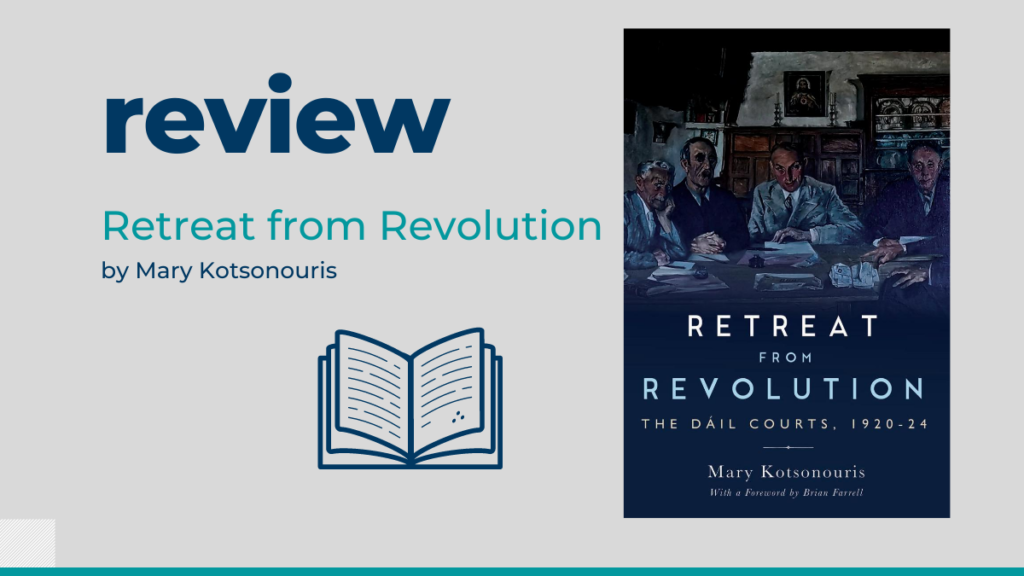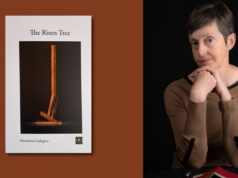
Retreat from Revolution: the Dáil Courts, 1920–24.
by Mary Kotsonouris | Irish Academic Press | €18.95 | 9781788551250
review by David O’Donoghue
It’s astonishing to recall how the path to Irish statehood was paved during the War of Independence from 1919 to 1921. Apart from establishing our own parliament in January 1919 (on foot of Sinn Féin’s victory in the December 1918 Westminster election), there was a parallel army and police force operating under the noses of British Crown forces.
These were fraught times for the country as the Anglo–Irish war dragged on with no end in sight. The author—a distinguished lawyer and later a district court judge—first published this work in 1994. It is now reissued to mark the centenary of the first Dáil establishing a courts system as an alternative to the British judicial network. The new courts, variously called Dáil, republican or Sinn Féin courts, were clandestine. They held sessions in schools, creameries, farmhouses, barns ‘and any place with four walls and a roof’.
Judges were picked from the local community and included priests and businessmen. The author notes that one such judge who dared to hold a republican court in public paid a heavy price, being sentenced to two years hard labour.
The first I heard of these courts, which were the forerunners of our present-day judicial system, was when I interviewed Mrs Elizabeth Clissmann about twenty years ago in her home on Dublin’s Merrion Road. She was from a republican family in Sligo and her father Denis Mulcahy had been a judge in the Sinn Féin courts. His day job, so to speak, was as headmaster of Sligo technical school. According to Mrs Clissmann, the underground courts ‘dealt with the theft of sheep and goats, and such things’.
But this book’s account shows they went far beyond such mundane matters, ruling on trespass, land disputes, compensation claims and assault. Mary Kotsonouris notes that there are scant records of Dáil court sittings apart from brief newspaper reports, adding that ‘solicitors kept no records of cases tried in the Dáil Éireann courts during a considerable period. It would have been dangerous for the solicitor [to do so] and for the people for whom he acted’.
As to the punishments handed down by republican courts, the author states that ‘local [IRA] Volunteer companies abducted and punished thieves and petty criminals. They also ‘directed public order at race meetings and fair days, and in parts of country burnt down the existing court houses’.
Some names, apart from the obvious ones, tend to ring a bell. Conor Maguire was a Dáil court judge who became attorney general and later chief justice in the new Free State. His nephew, also Conor, was a barrister, who for many years presented RTE radio’s popular jazz programme ‘In the mood’. Peter Maguire (the chief justice’s son) also became a senior counsel and was Charlie Haughey’s barrister at the Arms Trial in 1970. Ireland being a small country, it’s no surprise that some offspring would choose to follow in their parents’ footsteps. I should add, however, that the opposite happened in my family. My father, Michael ‘Steve’ O’Donoghue worked for the Munster & Leinster Bank for 45 years. His advice to me on leaving school: ‘Don’t ever set foot in the bank’! He was only ten when the War of Independence began, and once confided to me that he had slept with a gun under his pillow. His parents’ instructions were to ‘say nothing, just shoot’ if the Black and Tans turned up. Thankfully, they never did. His first cousin James was not so lucky, however, having been shot dead by troops of the Essex regiment outside Bandon in early December 1920, aged only 18.
On a lighter note, I had a quiet chuckle at the author’s description of George Gavan Duffy’s resignation from the provisional government in 1924 in protest at Ernest Blythe’s decision to scrap the Dáil courts in favour of a new judicial system. But he had no qualms about accepting the job of president of the High Court some years later. The author clearly agrees with Gavan Duffy’s stance, calling the move to abolish the republican courts ‘ill-judged’ since they were later reinstated ‘in a more expensive and elaborate guise’.
***
David O’Donoghue’s memoir, Newsroom Insider: what the public never saw, will be published next year.












